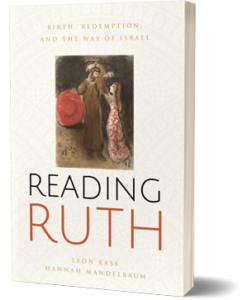Rabbi Meir Soloveichik delves into the deepest meaning of the most consequential code of ethics in human history.
Lectures Streaming Mondays at 7:00 PM EDT on:
April 12| April 19 | April 26 | May 3 | May 10
It was John Adams who reflected that “the Hebrews have done more to civilize man than any other nation.” Why? Because he believed that biblical monotheism was “the foundation of all morality and consequently all civilization.” If the Hebraic vision changed the world forever, it is the code that has become known as the Ten Commandments that most succinctly captures this Jewish theological and moral worldview. Yet, as famous as the Decalogue is, the commandments are often misunderstood, and in a contemporary culture cut off from its scriptural roots, it is critical to discover them anew.
That is what we will do in this series of five lectures—each examining two commandments. We will conclude ahead of the holiday of Shavuot, when Jews commemorate the revelation and Sinai that first brought the Ten Commandments to the world.
Registrants will be emailed a link to each live lecture on the day of each session, with an additional reminder sent approximately one hour before the stream begins.
Every lecture will also be recorded and sent to registrants within 48 hours of each lecture’s conclusion.
The 1st and 2nd Commandments
Monday, April 12, 2021 | 7:00 PM EDT
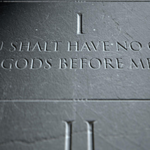 How Do We Know God? The First Commandment
How Do We Know God? The First Commandment
It was Judah Halevi, Judaism’s greatest poet, who pondered the remarkable fact that the one true God sought to be known to the world not first and foremost as the Creator of the Universe, but as the God of Abraham, Who took Israel out of Egypt. What does the first commandment teach us about the way in which Judaism links the particular to the universal?
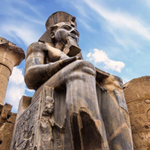 Judaism vs. Idolatry: The Second Commandment
Judaism vs. Idolatry: The Second Commandment
It is often assumed that Judaism’s confrontation with paganism is a phenomenon of the past, but this would be a mistake. Understanding why requires an understanding of what paganism truly is; and why many of its original assertions are being embraced again today.
The 3rd and 4th Commandments
Monday, April 19, 2021 | 7:00 PM EDT
 Who Is God? The Third Commandment and the Name of the Lord
Who Is God? The Third Commandment and the Name of the Lord
The theologian Michael Wyschogrod noted that one of the fascinating aspects of the Bible is that the Creator has a personal name, one so linked to Himself that it is sacred, awe-inspiring, and ineffable. What does this fact tell us about the biblical vision of God, and how we ought to relate to Him?
 The Most Misunderstood Day: Sabbath and the Fourth Commandment
The Most Misunderstood Day: Sabbath and the Fourth Commandment
Judaism gave the world the idea of a “day of rest,” yet the essence of the Sabbath remains profoundly misunderstood. What do the manifold rules and rituals of Shabbat teach us about the nature of work, and the meaning of life itself?
The 5th and 6th Commandments
Monday, April 26, 2021 | 7:00 PM EDT
 God, Father, and Mother: The Partnership That Defines the Jewish Family
God, Father, and Mother: The Partnership That Defines the Jewish Family
Jewish art and tradition have always ardently insisted that the commandment to honor one’s father and mother was placed on the first tablet, along with the obligations that man bears toward God. What does this mean for Judaism’s understanding of parenthood, and what does it tell us about the essence of faith?
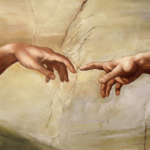 Human Life and the Divine Life: The Sixth Commandment
Human Life and the Divine Life: The Sixth Commandment
No moral teaching is more significant for the Hebraic vision than the notion that all human beings are created in the image of God; but what is the intention of this linkage between man and the Divine? In the answer to this conundrum, we discover a truth that the West once understood, and is now in danger of forgetting.
The 7th and 8th Commandments
Monday, May 3, 2021 | 7:00 PM EDT
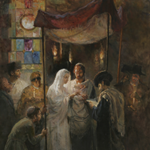 Family and the Seventh Commandment
Family and the Seventh Commandment
The sanctity of the marital covenant is commonly compared by the prophets to Israel’s relationship with God, and this tells us a great deal about the Jewish idea of family and faith.
 Life, Liberty, and Judaism: The Eighth Commandment and the Birth of Human Rights
Life, Liberty, and Judaism: The Eighth Commandment and the Birth of Human Rights
Everyone has heard of the verse, “Thou shalt not steal;” but few understand its full meaning and implications. In Hebrew, the injunction is a mere two words, but in them can be found a notion of human rights that would profoundly impact humanity.
The 9th and 10th Commandments
Monday, May 10, 2021 | 7:00 PM EDT
 When It Displeases the Court: Truth, Testimony, and the Ninth Commandment
When It Displeases the Court: Truth, Testimony, and the Ninth Commandment
We have all heard the oath to tell a court “the truth, the whole truth, and nothing but the truth.” In prohibiting perjury, the Torah may be going further, and seeking to teach us about the nature of Truth itself.
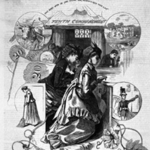 The Green-Eyed Monster: Envy and the End of the Decalogue
The Green-Eyed Monster: Envy and the End of the Decalogue
The conclusion of the Ten Commandments appears anti-climactic. We all understand that envy is a vice; but why should “Thou shalt not covet” bring the most awe-inspiring revelation in history to a close? The answer tells us a great deal about the purpose of all of the commandments, and why they are so essential for civilization.
Registration
- We kindly suggest a donation of $100 to support Tikvah’s important educational programming on Jewish and Zionist ideas. The Tikvah Fund is a 501(c)(3) charity classified as a private operating foundation.
- If you make a donation of $250 or more, we will send you a complimentary copy of Reading Ruth: Birth, Redemption, and the Way of Israel, by Dr. Leon Kass and Hannah Mandelbaum. This new book, published by the Tikvah Fund, offers a close and careful reading of one of the Bible’s most beloved books, enabling readers to imagine how a widowed woman from an alien nation becomes the ancestress of the greatest Israelite king. This short study is a perfect way to prepare for the upcoming holiday of Shavuot, when Jews traditionally read the Book of Ruth.
- Registrants will be emailed a link to each livestream on the day of each session, with an additional reminder sent approximately one hour before the stream begins. For more information or to ask a question, please contact us at info@tikvahfund.org.
This form may not work if you are using older versions of Internet Explorer or Microsoft Edge as your web browser. If you are able, please switch to Google Chrome, Firefox, Safari, or Opera. If you continue to have difficulty, please contact us at info@tikvahfund.org.
If you would prefer to make a gift by check, please make it payable to “The Tikvah Fund” and mail it to: The Tikvah Fund, 165 East 56th Street, 4th Floor New York, NY 10022.
About Rabbi Soloveichik
 Rabbi Dr. Meir Y. Soloveichik is the rabbi of Congregation Shearith Israel in Manhattan, the oldest Jewish community in the United States, founded in 1654. He is also director of the Zahava and Moshael Straus Center for Torah and Western Thought at Yeshiva University. Rabbi Soloveichik has lectured internationally to Jewish and non-Jewish audiences on topics relating to faith in America, the Hebraic roots of the American founding, Jewish theology, bioethics, wartime ethics, and Jewish-Christian relations. His essays have appeared in the Wall Street Journal, Mosaic, the Jewish Review of Books, Commentary, First Things, Azure, Tradition, and the Torah U-Madda Journal. Rabbi Soloveichik is a descendent of one of the great dynasties of Orthodox Judaism. He graduated summa cum laude from Yeshiva University, received his rabbinic ordination from the Rabbi Isaac Elchanan Theological Seminary, and studied at its Beren Kollel Elyon. He has also studied at Yale Divinity School, and in 2010, he received his doctorate in religion from Princeton University.
Rabbi Dr. Meir Y. Soloveichik is the rabbi of Congregation Shearith Israel in Manhattan, the oldest Jewish community in the United States, founded in 1654. He is also director of the Zahava and Moshael Straus Center for Torah and Western Thought at Yeshiva University. Rabbi Soloveichik has lectured internationally to Jewish and non-Jewish audiences on topics relating to faith in America, the Hebraic roots of the American founding, Jewish theology, bioethics, wartime ethics, and Jewish-Christian relations. His essays have appeared in the Wall Street Journal, Mosaic, the Jewish Review of Books, Commentary, First Things, Azure, Tradition, and the Torah U-Madda Journal. Rabbi Soloveichik is a descendent of one of the great dynasties of Orthodox Judaism. He graduated summa cum laude from Yeshiva University, received his rabbinic ordination from the Rabbi Isaac Elchanan Theological Seminary, and studied at its Beren Kollel Elyon. He has also studied at Yale Divinity School, and in 2010, he received his doctorate in religion from Princeton University.
